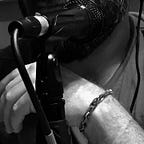Americans Really Hate Each Other
--
Why we are bad at defining who is good and who is bad
Something has happened in American conversation that you may not have known about. Very subtly, over time, human beings have been replaced, it seems to be, by a sly demonic force that have either embodied those formerly know as our neighbors or have themselves taken on bodies that appear to us to be human. We do know that regardless of the mode, their means and methods are the same. They want to destroy this country!
Destroy it, I tell you.
And if you think I’m far off, I ask you to check your local news editorial tonight. Go ahead and do a tally. Here are the two options. Did the conversation at hand…
A) Question the merits of an idea?
B) Question the integrity of a person?
Something certainly has happened to us.
We have so begun to define the good and the bad by the person, that we don’t know what’s actually right or wrong anymore.
Human beings tend toward certain systems of belief, and they tend to accept the majority platform of whatever belief system they belong to. A Republican doesn’t only believe in small government, but he’ll most likely also be pro-life, strong defense and and balanced budget minded. At the same time a Protestant will not only disagree with the Papacy, but she will also disregard the idea of transubstantiation and veneration of the Virgin Mary. People that believe in legalized marijuana generally also believe that the government should stay out of marriage.
Now, these beliefs do, in many cases, have a tie that binds them together, but we often find ourselves caught in a current of ideas. It’s a river that draws us along with like-minded people moving toward a perceived future hope.
This is the current of the familiar in the path of righteousness.
No one naturally thinks that their thought stream and world view is flawed. We all believe we’ve use logic, reason and whatever evidence is available to come to an obvious conclusion. And so we tend to believe that the way we see things is right, and if right, then just and good. It becomes about honor. Everything turns into a WWII bond poster. The good is shiny and bright and the bad is vapid and dark.
And slowly but surely, our preferences, opinions and desires on every matter from religion to politics becomes more than just that; they become THE good. It’s so subtle, like a beguiling serpent. My thoughts are good and your thoughts are bad. I am good and you are bad. Me versus you. Us versus them.
Now does this mean that everything is relative and nothing is sure? No. When asked the question, “Who is the final prophet of God?”, one person says Muhammad, one Jesus Christ, one that there is no God. Someone in that group is wrong, maybe all of them.
This problem isn’t about right and wrong. This is about good and bad. This isn’t about what someone believes. This is about what we believe about someone.
Once we’ve defined another person’s beliefs as bad, and not wrong, we move on to defining the person. And here we find ourselves today.
If a Catholic celebrates lent, the Protestant calls them an extra-scriptural tradition-following heretic, even though all they are doing is fasting, praying and giving alms; quite scriptural ideas. If a Democrat mentions doing good work for “the children”, the Republican questions his motives, calls him a socialist and quotes all his perceived sins. If a Muslim invents something, the Christian lists the reasons Christianity has more positive affects on history. If the AARP doesn’t like the Conservative healthcare proposal, the Republican denounces them as biased because they donated money to Democrats in the last cycle.
If a man commits a crime, that is not all of his identity. If a homeless man asks for money, it doesn’t mean he has a gambling problem. If a person has failed in one area, it doesn’t mean they can’t have good intentions in another.
Catholics aren’t bad, but they have people that do bad things. Protestants aren’t bad, but they have people that do bad things. The same for Russians. The same for refugees. The same for whites and blacks. The same for your political opponent.
We shouldn’t interact with people by first learning where they fall in the geo-politico-religio-socio-economic spectrum.
“Oh, she’s a single mom.”
“Oh, he’s a Union Member.”
“Oh, he’s a Lutheran.”
“Oh, she believes in _____.”
We should speak loudly about what we believe to be true, and at the very least assume the humanity of the person in opposition to us. In the end, we will be judged on our actions, our love, our justice, our integrity.
And not on our tribe.
